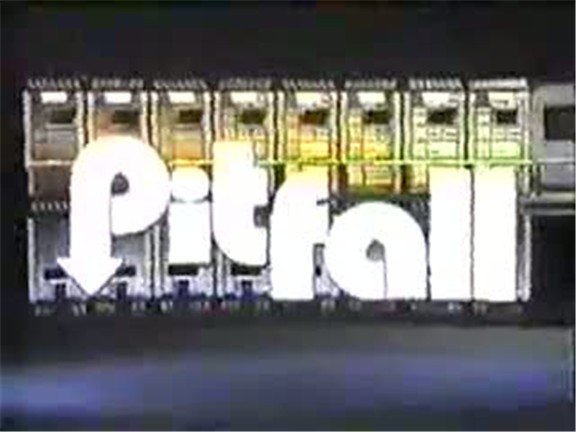|

Today, every wrong step could bring disaster, as our players attempt to
cross this bridge, and win a prize package worth over $5000. So watch
now as they brave the dangers to win a fortune on...
SHOW: PITFALL
AIR DATES: September 14, 1981 to April 23, 1982 (shown in the US during
1985-6)
CREATOR: Catalena Productions
HOST: Alex Trebek
WATCH IT HERE: YouTube
On occasion, you'll hear of a game show that didn't live up to the
promises. Rarely, you'll hear about a game show who stiffed the
contestants for one reason or another. But "Pitfall" is one of those
ultra-rare (if not UNIQUE) game shows in which it wasn't JUST the
contestants who got nothing. You see, Catalena Productions actually went
BANKRUPT during the show's run. So not only did some of the later champs
get nothing, but neither did host Alex Trebek! Rumor has it he keeps a
bounced check from the studio in his office to remind himself of "one of
the great tragedies of [his] life". But, truth be told, I'm not at all
surprised. I mean, the PREMISE of "Pitfall" was interesting enough...but
the EXECUTION did not work in the least.
HOW WAS IT PLAYED?
MAIN GAMEPLAY
Two contestants - including a returning champion - play a five-minute
round where they try to guess how the studio audience will answer
questions.
The host asks a question with four possible answers. The audience use
keypads by their chairs to answer the question. The champion picks the
one answer they think the plurality of the audience chose and the other
contestant chooses one of the other three. If either contestant picks
the answer the most audience members chose, they earn a point. This
round continues (with first choice switching between champ and
challenger) until a) one contestant gets five points or b) five minutes
elapse with the contestant with the most points winning. In case of a
tie, a tiebreaker question is asked with the one getting it right
winning the game.
The winner of the game earns "Pit Passes" depending on the number of
points they earn. One or two points get one "Pass", three or four get
two and five points earns the maximum of three "Pass"es.
BONUS ROUND ("PITFALL ROUND")
Before the round begins, the lights in the studio are dimmed and the
eight pits on the "bridge" used in the round start to light up one at a
time. Every pit lights up at least once, but THREE of them light up
twice. These are the "pitfall" pits used in the round. The champion then
chooses "Pit Passes" based on which numbered pits THEY think lit up
twice. The host and champion ride an elevator up to the bridge as the
prize package for winning the round is told. The host stays in front of
the champion on the bridge as they try to cross all eight spaces of it
and reach the platform on the other side in 100 seconds or less.
The host reads general knowledge questions to the champion. A right
answer allows them to advance one space on the bridge. If they step on a
space that has a "pitfall" and they do not have a "Pit Pass" for that
space, the space rides down into the pit. The host waits for the space
to hit the floor before continuing to ask questions. The champion needs
to answer a question correctly to escape the pit. Doing so stops the
clock and brings the space back up to the bridge level. After a brief
respite, the clock starts up again and the round continues. If the
champion DOES have a "Pit Pass", they hand it to the host and move
immediately to the next space (whether or not the space passed was a
"pitfall").
If the champion can cross all eight spaces and make it to the platform
on the other side in 100 seconds or less, they win a prize package.
Otherwise, they won $100 for each space they traversed. At first, the
prize package was over $5000. Later in the series, the $100 per space
was dropped, the champion won a smaller prize for getting to the fifth
space and crossing the bridge in time earned a $2500 prize package.
Two main games and two bonus games were played per episode, with a new
challenger facing the champion for each game.
WHAT WORKED?
The only thing I can see that worked was the set for the bonus game
itself. The rainbow-colored bridge looked pretty good and the suddenness
when a champion is unable to avoid a "pitfall" was exciting. And, mind
you, the champ was closer to the bridge than the full view we saw during
the "light show" so it was quite possible for them to miss a "pitfall"
or two...and that always spiced things up.
Despite Alex Trebek being embarrassed about the show, he at least
remained professional during it. I'm sure he took it as a learning
experience and then laughed it off when the "Jeopardy!" checks started
to roll in.
WHAT DIDN'T WORK?
The front game - like "Second Chance" - was detrimental to the bonus
game as it was slow and tedious in comparison. I know they were going
for uniqueness and essentially having a "Family Feud survey in real
time" WAS different for the times but it just didn't have the same spin
as a "Family Feud" or a "Card Sharks" where the surveys were taken in
advance.
I think it would've been a LITTLE better had the two contestants
secretly locked in their choices before explaining and revealing
them...and, if the two picked the same one, no points were given. Seemed
almost a given that whoever picked first would pick the right one,
leaving the other one to make up a lame excuse for picking what they're
SURE is a wrong answer.
Despite what I said about the "light show" before, a good player with
their head on a swivel can get the right ones rather easily...especially
on the occasion when they light up a pit twice in a row (stupidly,
IMAO). Someone who manages to get to five points in the front game and
has good eyes and memory can win the prize package easily...and what's
the fun in THAT?!
If Catalena couldn't handle everyone winning the $5000 package, I can
understand why they changed things around. But this was something that
should've been tested before the pilot came to be. If they had figured
out that people weren't as inattentive as they thought, they would have
saved themselves a LOT of money...and PROBABLY could have paid Alex, as
well.
WOULD IT WORK TODAY?
Really, the game wasn't TOO bad...I mean, for early 1980s Canadian
shows. I've seen worse from the Great White North. (I've seen BETTER, no
doubt, but...) The only things that were keeping the game from lasting
were a) the front game being boring AF and b) the company going kaput.
Some sort of "Joker's Wild" style front game with the winner
"purchasing" the "Pit Passes" probably would've gone better. These days,
it might work for syndication but I don't see any American studio
picking it up.
NEXT TIME: The
wedgies are on the other pair of tightie-whities...
Chris Wolvie always wondered why no one named "Harry" showed up on
this show.
Follow him on Twitter
@ChrisWolvie
and e-mail him at
chriswolvie@yahoo.com. |


